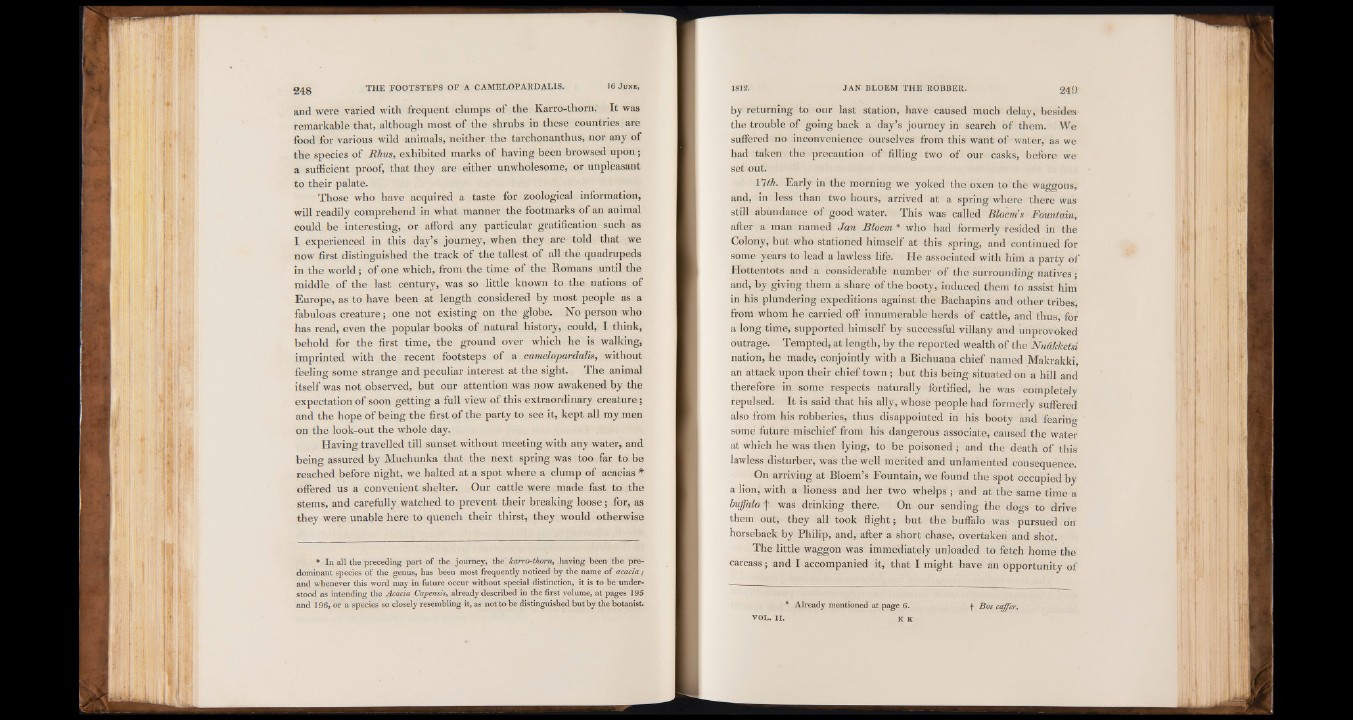
and were varied with frequent clumps of the Karro-thorn. It was
remarkable that, although most of the shrubs in these countries are
food for various wild animals, neither the tarchonanthus, nor any of
the species of Rhus, exhibited marks of having been browsed upon ;
a sufficient proof, that they are either unwholesome, or unpleasant
to their palate.
Those who have acquired a taste for zoological information,
will readily comprehend in what manner the footmarks of an animal
could be interesting, or afford any particular gratification such as
I experienced in this day’s journey, when they are told that we
now first distinguished the track of the tallest of all the quadrupeds
in the world; of one which, from the time of the Romans until the
middle of the last century, was so little known to the nations of
Europe, as to have been at length considered by most people as a
fabulous creature; one not existing on the globe. No person who
has read, even the popular books of natural history, could, I think,
behold for the first time, the ground over which he is walking,
imprinted with the recent footsteps of a Camelopardalis, without
feeling some strange and peculiar interest at the sight. The animal
itself was not observed, but our attention was now awakened by the
expectation of soon getting a full view of this extraordinary creature;
and the hope of being the first of the party to see it, kept all my men
on the look-out the whole day.
Having travelled till sunset without meeting with any water, and
being assured by Muchunka that the next spring was too far to be
reached before night, we halted at a spot where a clump of acacias *
offered us a convenient shelter. Our cattle were made fast to the
stems, and carefully watched to prevent their breaking loose; for, as
they were unable here to quench their thirst, they would otherwise
* In all the preceding part of the journey, the karro-thorn, having been the predominant
species of the genus, has been most frequently noticed by the name of acacia;
and whenever this word may in future occur without special distinction, it is to be understood
as intending the Acacia Capensis, already described in the first volume, at pages 195
and 196, or a species so closely resembling it, as not to be distinguished but by the botanist.
by returning to our last station, have caused much delay, besides
the trouble of going back a day’s journey in search of them. We
suffered no inconvenience ourselves from this want of water, as we
had taken the precaution of filling two of our casks, before we
set out.
1 *lth. Early in the morning we yoked the oxen to the waggons,
and, in less than two hours, arrived at a spring where there was
still abundance of good water. This was called Bloem's Fountain,
after a man named Jan lilocm # who had formerly resided in the
Colony, but who stationed himself at this spring, and continued for
some years to lead a lawless life. He associated with him a party of
Hottentots and a considerable number of the surrounding natives •
and, by giving them a share of the booty, induced them' to assist him
in his plundering expeditions against the Bachapins and other tribes,
from whom he carried off innumerable herds of cattle, and thus, for
a long time, supported himself by successful villany and unprovoked
outrage. Tempted, at length, by the reported wealth of the Nuahhelsi
nation, he made, conjointly with a Bichuana chief named Makrakki,
an attack upon their chief town ; but this being situated on a hill and
therefore in some respects naturally fortified, he was completely
repulsed. It is said that his ally, whose people had formerly suffered
also from his robberies, thus disappointed in his booty and fearing
some future mischief from his dangerous associate, caused the water
at which he was then lying, to be poisoned; and the death of this
lawless disturber, was the well merited and unlamented consequence.
On arriving at Bloem’s Fountain, we found the spot occupied by
a lion, with a lioness and her two whelps; and at the same time a
buffalo f was drinking there. On our sending the dogs to drive
them out, they all took flight; but the buffalo was pursued on
horseback by Philip, and, after a short chase, overtaken and shot.
The little waggon was immediately unloaded to fetch home the
carcass; and I accompanied it, that I might have an opportunity of
* Already mentioned at page 6.
VOL. II. k K
f Bos coffer.